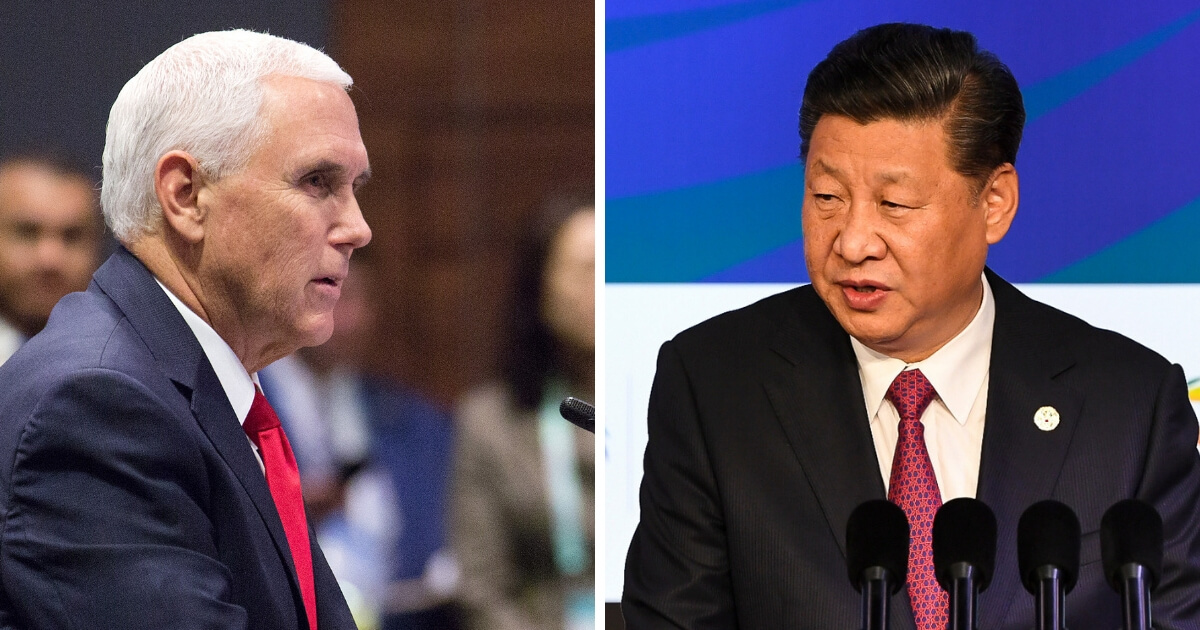
Pence vs. Chinese President: World Leaders Trade Barbs at National Summit
U.S. Vice President Mike Pence and Chinese President Xi Jinping traded blows Saturday as they offered different visions for the Asia-Pacific region.
Both Pence and Xi spoke at the Asia Pacific Economic Co-operation summit in Papua New Guinea about China’s aggressive push for influence in the region.
Pence harshly criticized China’s infrastructure plan, known as the “Belt and Road Initiative,” by pointing out the massive debt incurred by developing countries who accept China’s low-quality projects, according to The Associated Press.
“We do not offer constricting belt or a one-way road. When you partner with us, we partner with you and we all prosper,” Pence said.
Seeming to imply that China threatens the independence of developing countries by saddling them with enormous debt, the vice president offered them a better option.
“We don’t drown our partners in a sea of debt, we don’t coerce, compromise your independence,” Pence said.
The United States deals openly and fairly – and we don’t offer a constricting belt or a one-way road. When you partner with us, we partner with you, and we all prosper. #APEC2018 pic.twitter.com/pjL9XM9Sz2
— Vice President Mike Pence (@VP) November 17, 2018
Pence also criticized China’s policies on trade and intellectual property, which led to President Donald Trump’s tariffs against China.
“The United States, though, will not change course until China changes its ways,” he said, reiterating Trump’s threats of more tariffs.
Pence also announced that the United States will be involved in helping Australia develop its new military base in Papua New Guinea.
This shouldn’t be news to China. Last month, Pence criticized China’s military buildup.
“China now spends as much on its military as the rest of Asia combined, and Beijing has prioritized capabilities to erode America’s military advantages on land, at sea, in the air, and in space,” he said.
Xi, who spoke before Pence, anticipated some of his criticisms and defended China’s international infrastructure plan.
“It is not designed to serve any hidden geopolitical agenda, it is not targeted against anyone and it does not exclude anyone,” Xi said. “It is not an exclusive club that is closed to non-members, nor is it a trap as some people have labeled it.”
He also attempted to attack U.S. trade policy with China, according to Reuters.
“History has shown that confrontation, whether in the form of a Cold War, hot war, or trade war will produce no winners,” Xi said.
He also said “the shadow of protectionism and unilateralism” was inhibiting global economic growth.
However, China practices its own brand of protectionism with unprecedented state subsidies for Chinese businesses while making it difficult for foreign businesses to work in China.
While things appear to be heating up between the U.S. and China, Trump’s meeting with Xi at the G20 summit later this month might cool tensions.
Truth and Accuracy
We are committed to truth and accuracy in all of our journalism. Read our editorial standards.
Advertise with The Western Journal and reach millions of highly engaged readers, while supporting our work. Advertise Today.











